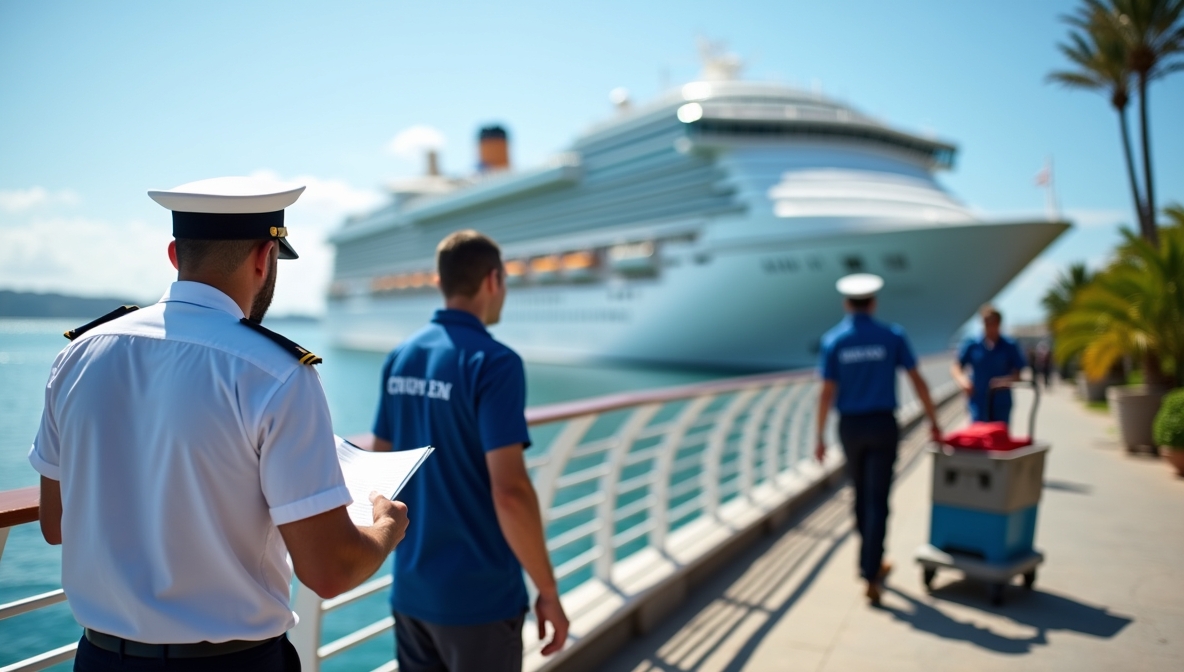Cruise ship worker background screening requires comprehensive international compliance protocols that extend far beyond standard employment checks, involving maritime-specific certifications, multi-jurisdictional criminal history verification, and specialized security clearances. This complex screening process ensures passenger safety while meeting international maritime regulations and port authority requirements across multiple countries.
Key Takeaways
- Maritime background checks involve multi-layered screening including criminal history, employment verification, medical clearances, and specialized maritime certifications required by international law.
- International compliance requirements mandate screening across all countries where applicants have lived or worked, with specific focus on STCW certification and port state control regulations.
- Processing timelines typically range from 2-8 weeks depending on the number of countries involved and complexity of verification requirements for international maritime positions.
- Costs vary significantly from $150-800 per screening based on geographic scope, with additional fees for expedited processing and specialized maritime security clearances.
- Legal compliance involves multiple frameworks including FCRA regulations, international maritime law, and country-specific employment screening requirements for each port of call.
- Documentation requirements are extensive and include passport verification, visa eligibility, medical fitness certificates, and proof of maritime training credentials from recognized institutions.
Understanding Cruise Ship Worker Background Screening Requirements
Cruise ship worker background screening represents one of the most comprehensive employment verification processes in any industry. Unlike traditional land-based employment, maritime positions require compliance with international regulations, multiple country jurisdictions, and specialized safety protocols. The screening process encompasses criminal background checks across all countries of residence, employment history verification, maritime certification validation, and medical fitness assessments.
The complexity stems from the international nature of cruise operations, where ships frequently change jurisdictions and dock at ports worldwide. Maritime employers must ensure their crew members can legally work in international waters and gain entry to various countries during port calls. This requires extensive documentation and verification processes that far exceed typical employment screening standards.
Maritime employee background checks have evolved significantly in 2025, with enhanced digital verification systems and stricter security protocols following recent international maritime security updates. Modern cruise line employment screening now incorporates real-time database monitoring and automated compliance tracking. These advances help streamline the traditionally lengthy verification process while maintaining rigorous security standards.
Core screening components include:
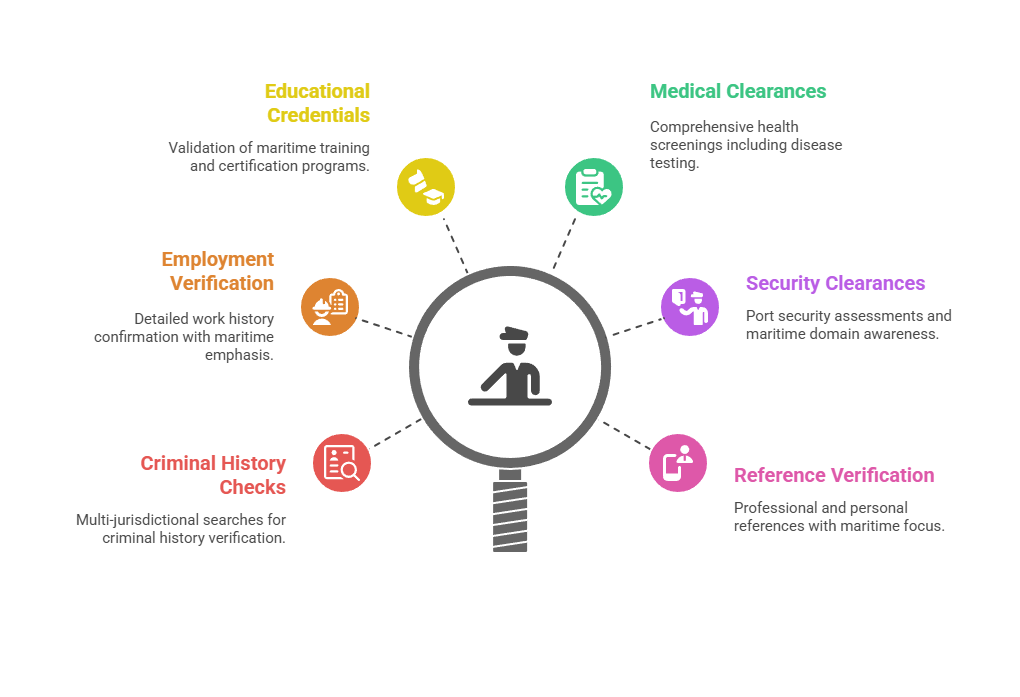
- Criminal history checks: Multi-jurisdictional searches covering all countries of residence and citizenship
- Employment verification: Detailed work history confirmation with emphasis on maritime experience
- Educational credentials: Validation of maritime training and certification programs
- Medical clearances: Comprehensive health screenings including communicable disease testing
- Security clearances: Port facility security assessments and maritime domain awareness checks
- Reference verification: Professional and personal references with maritime industry focus
International Maritime Background Check Components
Criminal History Verification Across Multiple Jurisdictions
International maritime background checks require criminal history searches in every country where an applicant has lived, worked, or held citizenship for specified periods. Most cruise lines require searches going back 5-10 years, with some positions requiring lifetime criminal history verification. The process involves coordinating with law enforcement agencies, courts, and government databases across multiple countries with varying response times and documentation requirements.
Recent changes in 2025 have improved international database sharing between key maritime jurisdictions. However, significant variations still exist in processing times and documentation standards. Some countries have implemented digital certification systems that reduce verification timelines considerably.
Jurisdiction Requirements by Region:
| Region | Typical Requirements | Processing Time |
| North America | FBI checks, provincial/state records | 2-4 weeks |
| European Union | National police certificates, Schengen database | 3-6 weeks |
| Asia-Pacific | Country-specific police clearances | 4-8 weeks |
| Caribbean/Latin America | National criminal registries | 2-6 weeks |
The verification process must account for different legal systems, languages, and administrative procedures. Some countries require apostille certification or embassy authentication, adding complexity and processing time to the overall screening timeline.
Maritime Certification and Licensing Verification
Cruise line employment screening includes verification of all maritime certifications required under the International Convention on Standards of Training, Certification and Watchkeeping for Seafarers (STCW). These certifications ensure crew members possess necessary skills and training for safe ship operations. Verification involves confirming authenticity with issuing maritime authorities and ensuring certifications remain current and valid.
The 2025 STCW amendments have introduced additional cybersecurity training requirements for certain positions. These new requirements reflect the growing importance of digital security in maritime operations. Verification now includes confirmation of both traditional maritime skills and modern technology competencies.
Essential STCW certifications typically verified:
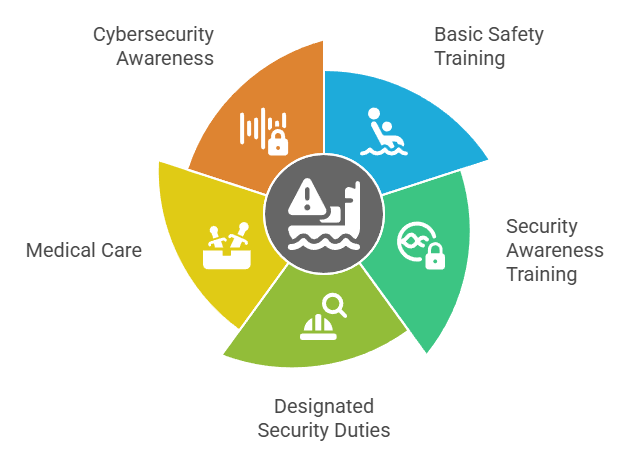
- Basic Safety Training (BST): Personal survival techniques, fire prevention, elementary first aid, and personal safety
- Security Awareness Training: Ship and port facility security protocols under ISPS Code requirements
- Designated Security Duties: Advanced security training for crew members with specific security responsibilities
- Medical Care: First aid and medical care certification appropriate to position level and ship operations
- Cybersecurity Awareness: New 2025 requirement for positions with system access responsibilities
Employment History and Reference Verification
Thorough employment verification extends beyond basic job confirmation to include performance evaluations, safety records, and disciplinary actions. Maritime employers require detailed work histories with particular emphasis on previous shipboard experience and safety compliance. Reference verification typically involves contacting former supervisors, maritime authorities, and professional colleagues who can attest to an applicant's competency and character.
International maritime background checks often face challenges when verifying employment with foreign shipping companies or maritime organizations. Language barriers, time zone differences, and varying record-keeping practices can complicate the verification process. Nevertheless, comprehensive employment verification remains crucial for ensuring crew competency and safety standards.
Legal Compliance Framework for Maritime Employment Screening
Maritime employment screening operates under a complex legal framework combining U.S. employment law, international maritime regulations, and country-specific requirements for each port of call. For U.S.-based cruise operations, the Fair Credit Reporting Act (FCRA) governs background screening procedures, requiring proper disclosure, authorization, and adverse action protocols. However, international maritime law adds additional layers of compliance requirements that extend beyond traditional FCRA obligations.
The Maritime Transportation Security Act (MTSA) requires Transportation Worker Identification Credentials (TWIC) for certain positions, involving additional security screening by the Transportation Security Administration. International maritime background checks must also comply with port state control requirements, which vary by country and can affect crew members' ability to work on ships calling at specific ports.
Recent 2025 updates to maritime security regulations have introduced enhanced screening requirements for crew members with access to sensitive ship systems. These changes reflect growing concerns about cybersecurity threats and technological vulnerabilities in modern cruise operations. Compliance now requires additional verification of digital literacy and security awareness training.
Key compliance frameworks include:
- FCRA compliance: Proper disclosure, authorization, and adverse action procedures for U.S. operations
- MTSA requirements: TWIC credential verification and security threat assessments
- ISPS Code: International Ship and Port Facility Security Code compliance for vessel security
- Port state control: Country-specific requirements for crew documentation and background verification
- Flag state regulations: Requirements imposed by the country where the ship is registered
- MLC 2006: Maritime Labour Convention standards for seafarer employment conditions
Processing Timelines and Cost Considerations
Typical Processing Timeframes for International Screening
Processing timelines for cruise ship employment screening vary significantly based on the applicant's background complexity and the number of countries involved in verification. Simple cases with limited travel history may complete within 2-3 weeks, while complex international backgrounds can require 6-8 weeks or longer. Factors affecting timeline include government response times, document authentication requirements, and seasonal variations in processing capacity.
Rush processing options are available for urgent hiring needs, though expedited services typically cost 50-100% more than standard processing. Some countries offer expedited criminal history certificates for additional fees, while others maintain fixed processing schedules regardless of urgency. The introduction of digital verification systems in 2025 has reduced processing times for participating countries by approximately 20-30%.
Timeline factors and typical durations:
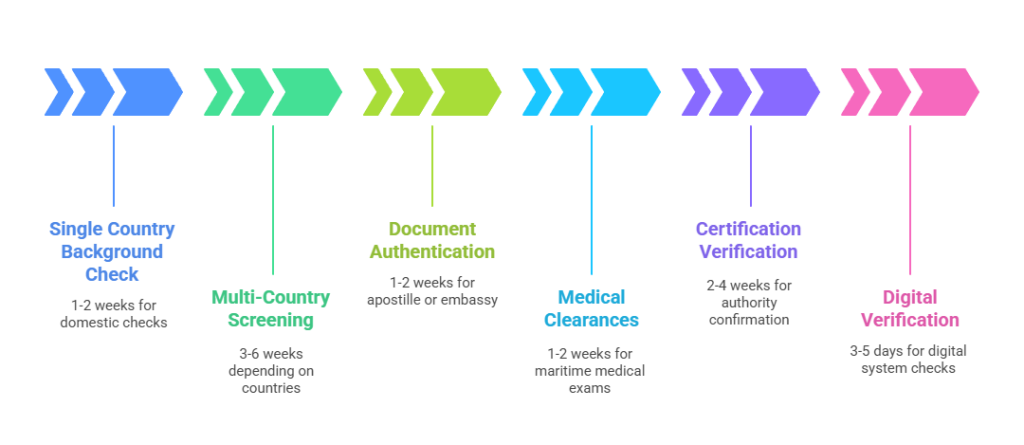
- Single country background: 1-2 weeks for domestic criminal history and employment verification
- Multi-country screening: 3-6 weeks depending on countries involved and document requirements
- Document authentication: Additional 1-2 weeks for apostille certification or embassy processing
- Medical clearances: 1-2 weeks for comprehensive maritime medical examinations
- Certification verification: 2-4 weeks for international maritime authority confirmation
- Digital verification: 3-5 days for countries with fully integrated digital systems
Cost Structure and Budgeting Considerations
Cruise line employment screening costs reflect the comprehensive nature of international verification requirements. Basic screening packages start around $150-200 for single-country checks, while comprehensive international screening can exceed $800 per applicant. Additional costs apply for expedited processing, document translation, authentication services, and specialized maritime security clearances.
Cost variations depend heavily on the specific countries involved and the complexity of required verifications. Some jurisdictions have implemented streamlined digital processes that reduce costs, while others maintain traditional paper-based systems with higher processing fees. The 2025 implementation of international data-sharing agreements has created cost savings for certain country combinations.
| Screening Component | Cost Range | Additional Considerations |
| Criminal history (per country) | $25-75 | Authentication fees may apply |
| Employment verification | $15-40 | International verification costs more |
| Education/certification verification | $20-60 | Maritime authority fees vary |
| Medical examination | $100-300 | Specialized maritime medical required |
| TWIC/security clearance | $125-200 | Government-set fees |
Employers should budget for potential re-screening costs, as some certifications require periodic renewal and criminal history checks may need updates for extended employment periods. Many cruise lines now implement ongoing monitoring systems that can reduce the frequency of complete re-screening requirements.
Documentation Requirements and Application Process
The documentation requirements for cruise ship worker background screening are extensive and vary based on position level, ship itinerary, and flag state requirements. Applicants must provide comprehensive personal history documentation, including all passports, visas, educational certificates, and employment records. Original documents or certified copies are typically required, with translation into English necessary for foreign-language documents.
New 2025 digital authentication standards allow for secure electronic document submission in many jurisdictions, reducing processing time and mailing delays. However, certain sensitive documents still require original submission or notarized copies. Applicants should verify current requirements with their screening provider to avoid processing delays.
The complexity of international maritime background checks means that incomplete documentation can significantly delay the screening process. Applicants benefit from preparing comprehensive document packages early in the application process. Many screening providers now offer preliminary document review services to identify potential issues before formal submission.
Essential documentation includes:
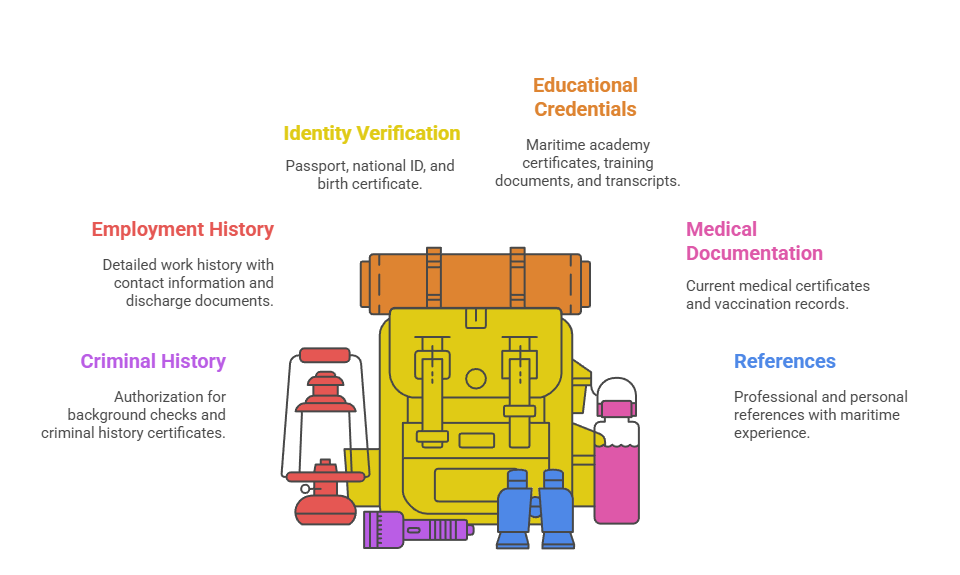
- Identity verification: Current passport, national identity cards, and birth certificates
- Educational credentials: Maritime academy certificates, training completion documents, and degree transcripts
- Employment history: Detailed work history with employer contact information and discharge documents
- Medical documentation: Current medical certificates and vaccination records meeting maritime standards
- Criminal history assistance: Authorization for background checks and any existing criminal history certificates
- References: Professional and personal references with maritime industry experience preferred
The application process typically involves multiple stages of document submission, verification, and follow-up. Applicants should prepare for potential requests for additional documentation or clarification during the screening process. Maintaining organized records and responding promptly to verification requests helps expedite the overall timeline.
Common Challenges and Solutions in Maritime Background Screening
Maritime background screening faces unique challenges stemming from the international nature of cruise operations and the diverse backgrounds of crew members. Document availability varies significantly between countries, with some nations lacking centralized criminal databases or having limited English-language documentation. Political instability, natural disasters, or administrative changes can disrupt normal verification processes, requiring alternative approaches to meet compliance requirements.
Language barriers present ongoing challenges, as documents must be translated and authenticated across multiple jurisdictions. Time zone differences and varying business practices complicate communication with international verification sources. Additionally, some countries restrict background information sharing with foreign employers, requiring specialized legal approaches to obtain necessary clearances.
Recent technological advances in 2025 have addressed some traditional challenges through improved digital platforms and international cooperation agreements. However, many fundamental issues persist due to the complexity of coordinating across multiple legal systems and jurisdictions. Successful screening programs require flexibility and expertise in navigating these diverse requirements.
Common challenges and practical solutions:
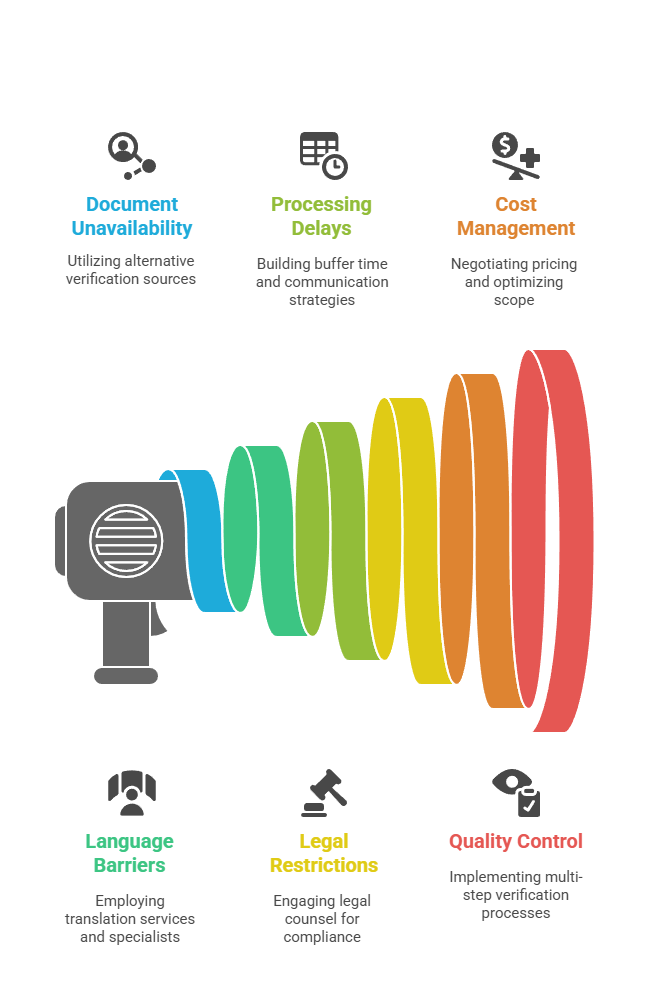
- Document unavailability: Work with local agents and alternative verification sources when official records are inaccessible. Many screening providers maintain networks of international contacts to facilitate difficult verifications.
- Language barriers: Partner with certified translation services and maintain relationships with multilingual verification specialists. Digital translation tools have improved significantly but still require human oversight for legal documents.
- Processing delays: Build buffer time into hiring schedules and maintain ongoing communication with all verification sources. Consider implementing preliminary screening steps to identify potential delays early.
- Legal restrictions: Engage local legal counsel and develop compliant verification procedures for restricted jurisdictions. Some countries require specific authorization processes or local representation.
- Cost management: Negotiate volume pricing with screening providers and optimize verification scope based on position requirements. Risk-based screening approaches can help balance thoroughness with cost efficiency.
- Quality control: Implement multi-step verification processes and maintain detailed audit trails for compliance documentation. Regular auditing helps identify and address process improvements.
Specialized Screening for Different Maritime Positions
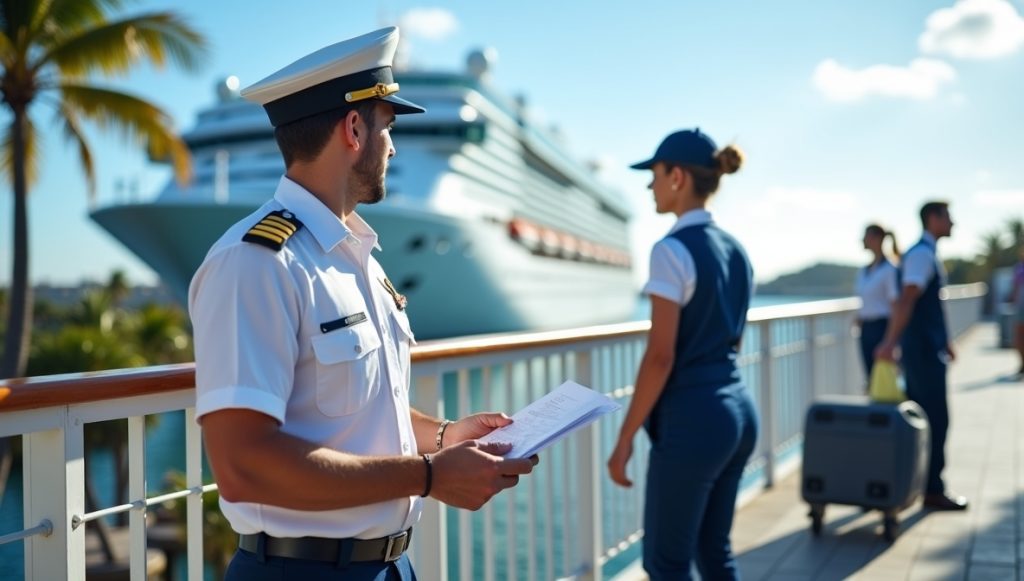
Different cruise ship positions require varying levels of background screening intensity and specialized verification requirements. Officers and crew members with security responsibilities undergo more comprehensive screening than entry-level positions. Bridge officers, engine room personnel, and those with access to sensitive ship systems face the most rigorous verification requirements.
Entertainment staff, hospitality workers, and shore excursion guides typically require standard criminal background checks and employment verification but may not need advanced maritime certifications. However, all positions require basic safety training verification and medical clearances appropriate to shipboard life.
The hierarchical nature of ship operations means that promotion opportunities often depend on successfully completing more intensive screening requirements. Career advancement in maritime employment frequently requires upgrading certifications and undergoing additional background verification processes.
Position-specific screening requirements:
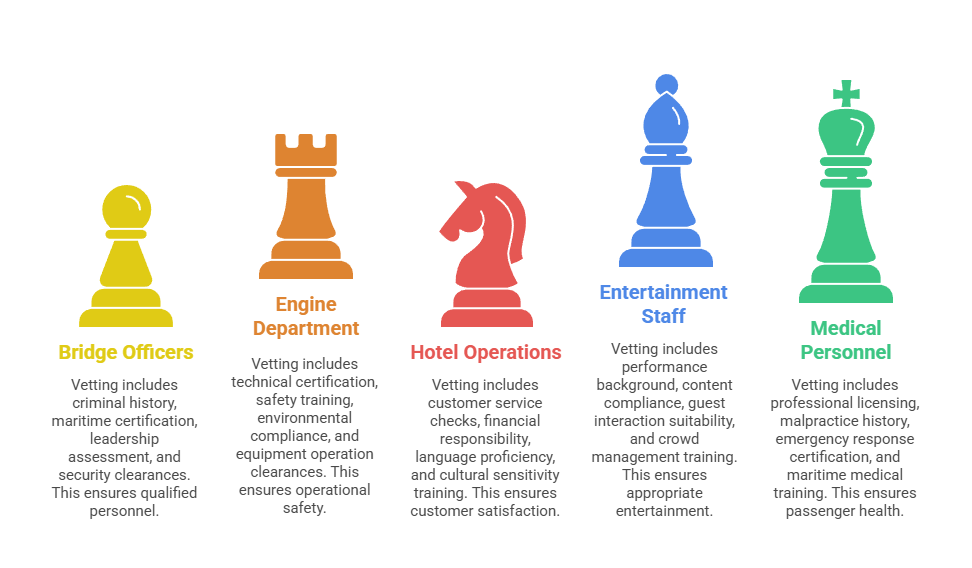
- Bridge Officers: Comprehensive criminal history, extensive maritime certification verification, leadership assessment, and advanced security clearances
- Engine Department: Technical certification verification, safety training confirmation, environmental compliance awareness, and specialized equipment operation clearances
- Hotel Operations: Customer service background checks, financial responsibility verification, language proficiency assessment, and cultural sensitivity training
- Entertainment Staff: Performance background verification, family-friendly content compliance, guest interaction suitability, and crowd management training
- Medical Personnel: Professional licensing verification, malpractice history review, emergency response certification, and specialized maritime medical training
Security-Sensitive Positions and Enhanced Screening
Certain cruise ship positions require enhanced security screening due to their access to sensitive areas, systems, or information. These positions undergo additional verification steps including comprehensive financial background checks, social media screening, and detailed personal history investigations. The enhanced screening process can add several weeks to standard processing timelines.
Security officers, bridge watch personnel, and crew members with administrative access to passenger information face the most stringent screening requirements. These positions often require periodic re-screening and ongoing monitoring throughout employment. The 2025 updates to maritime security protocols have expanded the list of positions requiring enhanced screening to include certain technical and maintenance roles.
Enhanced screening components:
- Financial background checks: Credit history review, bankruptcy verification, and debt-to-income analysis to assess financial stability and potential security risks
- Social media screening: Review of public social media profiles for concerning behavior, associations, or content that might affect passenger safety or company reputation
- Personal history investigation: Detailed interviews with references, neighbors, and associates to verify character and identify potential security concerns
Conclusion
Cruise ship worker background screening represents a complex intersection of international law, maritime regulations, and employment compliance requirements. Success requires understanding the multi-jurisdictional nature of verification processes and building adequate time and resources into hiring procedures. As the maritime industry continues evolving, screening protocols must balance comprehensive security requirements with operational efficiency while maintaining strict compliance with international regulations. Organizations investing in robust screening processes and staying current with regulatory developments will be best positioned for successful maritime recruitment and operations in 2025 and beyond.
Frequently Asked Questions
How long does cruise ship worker background screening typically take?
International maritime background screening typically takes 2-8 weeks depending on the applicant's history and countries involved. Simple domestic cases may complete in 2-3 weeks, while complex international backgrounds with multiple jurisdictions can require 6-8 weeks or longer. The 2025 implementation of digital verification systems has reduced processing times by 20-30% for participating countries.
What countries require background checks for cruise ship employment?
Background checks are required for all countries where an applicant has lived, worked, or held citizenship, typically covering the past 5-10 years. This includes countries of birth, citizenship, residence, and employment, with specific requirements varying by cruise line and ship itinerary. Some positions may require verification from all countries visited for extended periods.
How much does maritime employment background screening cost?
Costs range from $150-800 per screening depending on complexity and geographic scope. Basic single-country checks start around $150-200, while comprehensive international screening with multiple countries, medical clearances, and security certifications can exceed $800. Additional fees apply for expedited processing and specialized maritime security clearances.
What maritime certifications are verified during background screening?
All STCW (Standards of Training, Certification and Watchkeeping) certifications are verified, including Basic Safety Training, Security Awareness Training, Designated Security Duties, and Medical Care certifications. The 2025 STCW amendments have added cybersecurity training requirements for certain positions. Verification confirms authenticity with issuing maritime authorities and current validity status.
Can criminal history disqualify someone from cruise ship employment?
Criminal history is evaluated case-by-case based on nature, severity, and recency of offenses. Serious crimes, especially those involving violence, theft, drugs, or maritime safety violations, typically result in disqualification. Some positions may have stricter requirements than others, with security-sensitive roles maintaining the highest standards.
What happens if background screening documents are unavailable from certain countries?
When official documents are unavailable due to political instability, natural disasters, or administrative issues, alternative verification methods may be used. These can include affidavits, local agent verification, additional reference checks, or extended waiting periods for document availability. Some positions may require official documentation regardless of availability challenges.
Additional Resources
Still have questions?
Get in touch with our team today for a personalized demo and discover how our tailored volume pricing and packages can drive results for your business!
How useful was this page?*
Note: your comments are anonymous. We use them to improve the website. Do not include any personal details.
Visit our FCRA Compliance Tool or leave a message here if you need a response.
From the blog Explore the GCheck Content Hub

What Shows Up on a Home Health Aide Background Check: A Complete Compliance Guide for Employers and Job Seekers
4 Dec, 2025 • 18 min read
Hospital Volunteer Background Check: Complete Compliance Guide for Healthcare Facilities
4 Dec, 2025 • 20 min read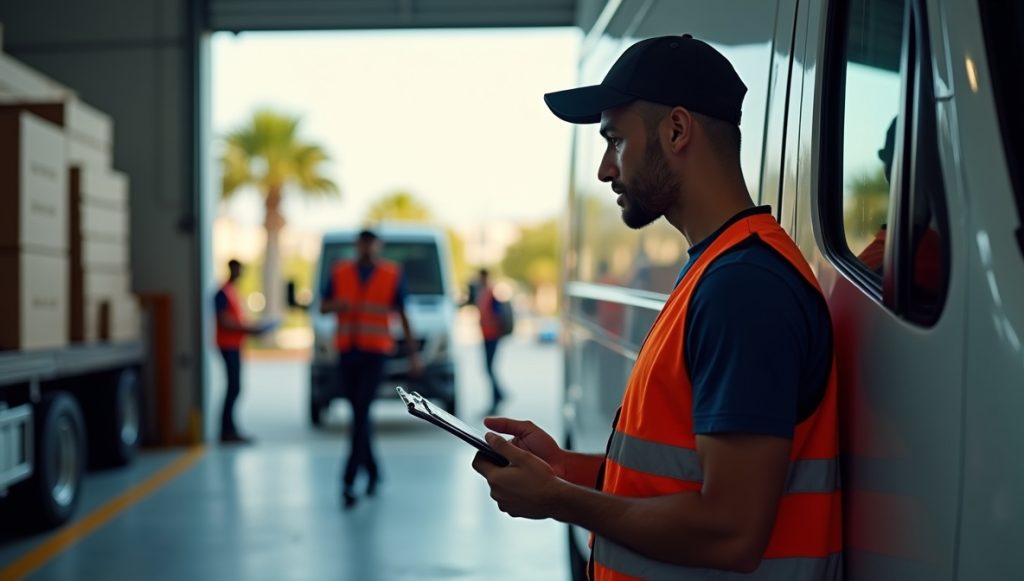
Florida MVR Check: Complete Guide to Driving Record Screening for Employers
4 Dec, 2025 • 16 min readThe information provided in this article is for general informational and educational purposes only and should not be construed as legal advice or a substitute for consultation with qualified legal counsel. While we strive to ensure accuracy, employment screening laws and regulations—including but not limited to the Fair Credit Reporting Act (FCRA), Equal Employment Opportunity Commission (EEOC) guidelines, state and local ban-the-box laws, industry-specific requirements, and other applicable federal, state, and local statutes—are subject to frequent changes, varying interpretations, and jurisdiction-specific applications that may affect their implementation in your organization. Employers and screening decision-makers are solely responsible for ensuring their background check policies, procedures, and practices comply with all applicable laws and regulations relevant to their specific industry, location, and circumstances. We strongly recommend consulting with qualified employment law attorneys and compliance professionals before making hiring, tenant screening, or other decisions based on background check information.
